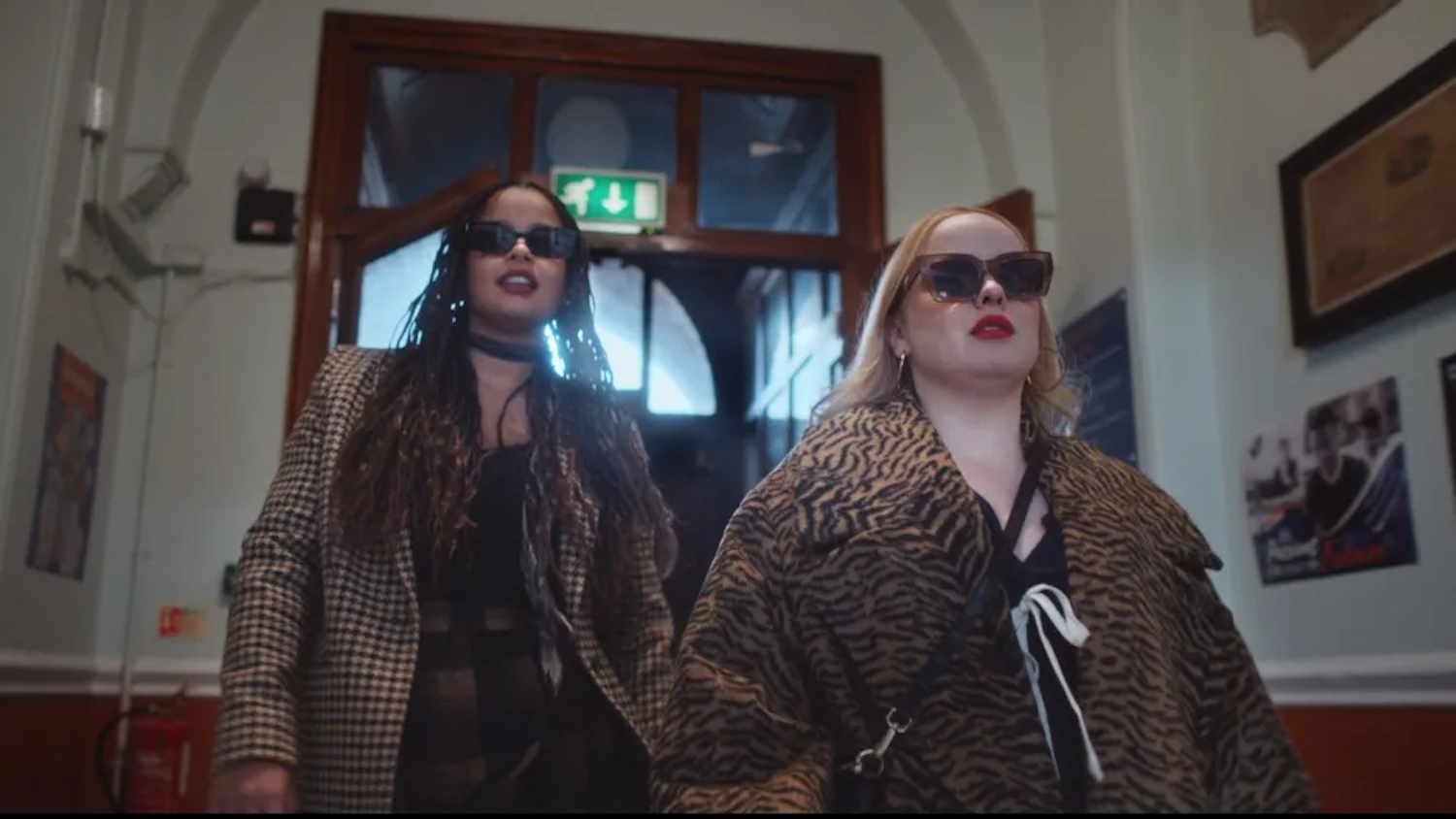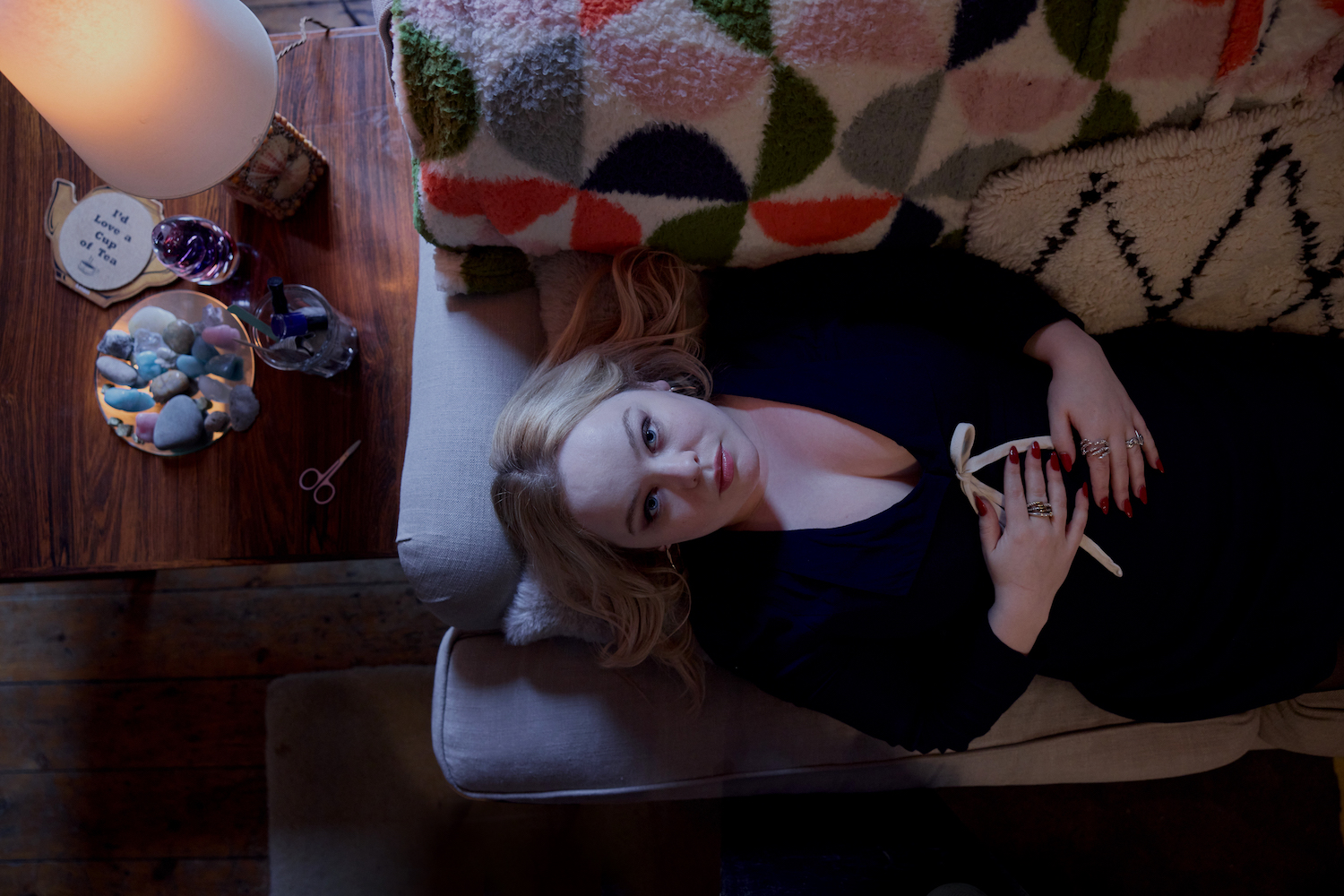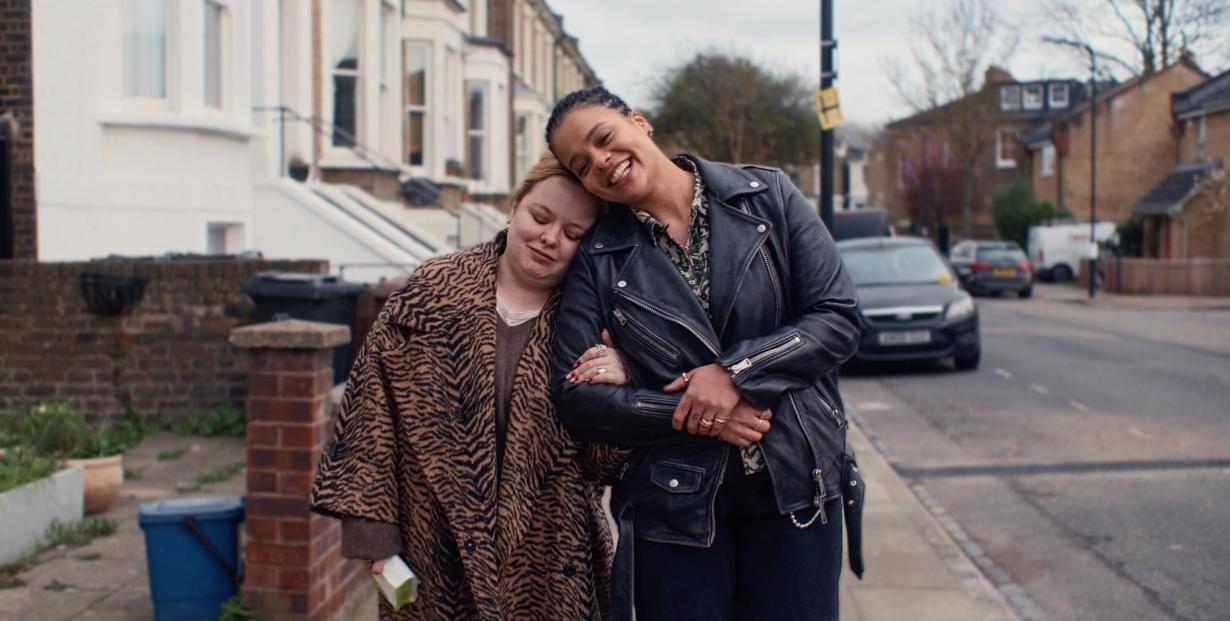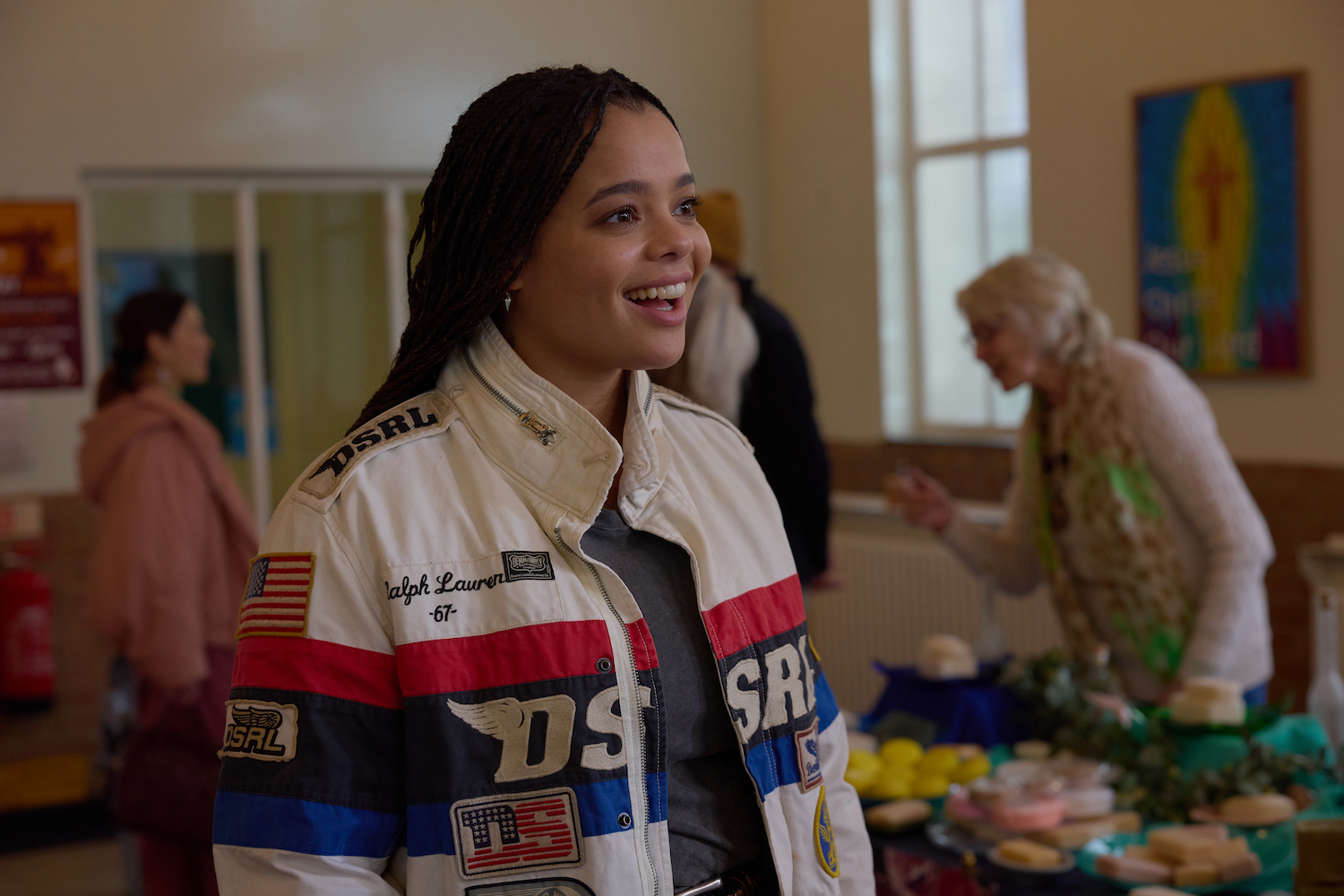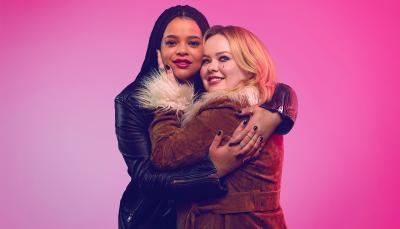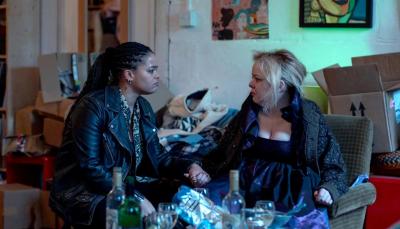'Big Mood' Creator On Making a Realistic Comedy About Mental Health
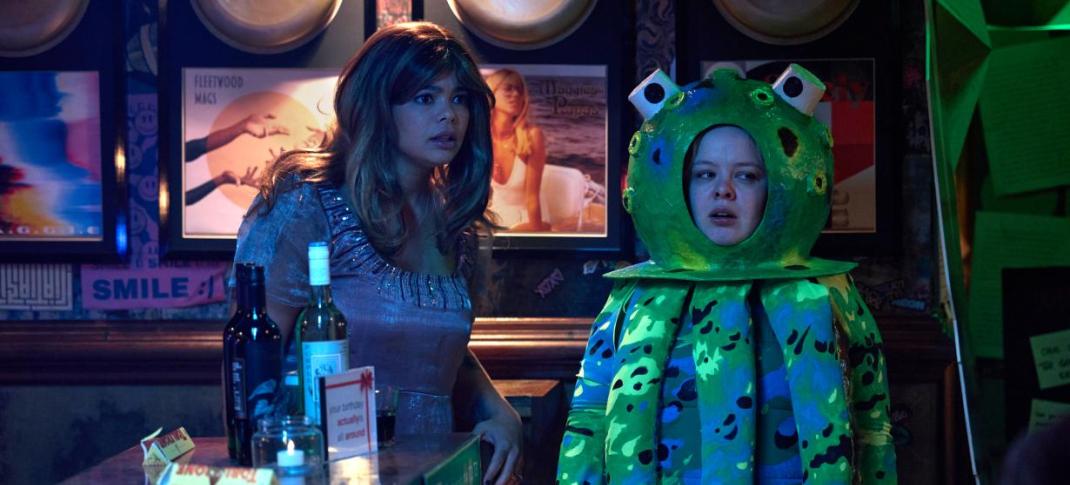
Some episodes of Big Mood feel like a fever dream--or a waking nightmare, like this ill-fated Love Actually party.
Channel 4
While many Anglophiles may not consider Tubi a destination for British TV content, it may be time to reconsider. The FAST channel streamer has already brought over offbeat shows like Boarders and Dead Hot, but the buzzy comedy Big Mood, which arrived this past weekend, is perhaps the network’s best chance for a genuine word-of-mouth hit.
The series, which stars Nicola Coughlan (Bridgerton) and Lydia West (It’s a Sin), is funny, heartbreaking, and heartfelt by turns. Centered on a pair of ride-or-die best friends named Maggie (Coughlan) and Eddie (West), the show follows the ups and downs of their relationship through dating problems, bizarre social hijinks, and the struggles of adult responsibilities like careers and finances. But what sets the show apart is that it’s also a story of mental illness and the toll living with a mood disorder can take on more than just the person who’s been diagnosed with it.
That’s what the show’s title refers to, for the record: Big Mood isn’t just a fun bit of internet slang, but a nod to the cycles of Maggie’s mania and depression because she has bipolar disorder. And while her diagnosis often has negative consequences for everyone in her life, it’s tough on Eddie, who frequently finds herself handling Maggie’s various crises rather than dealing with her own needs.
We chatted with Big Mood creator Camilla Whitehill and director Rebecca Asher about the friendship at the heart of the series, telling a story of mental illness that doesn’t feel like an after-school special, and more.
The following interview has been edited for length and clarity.
Telly Visions: Where did the idea for this show come from? There are a lot of shows that are coming-of-age comedies, but this one feels different to me. It’s a little…not grimmer, but maybe more melancholy in many ways. I’d love to hear how it came to life.
Camilla Whitehill: Well, I think I’m just a bit grim, is probably a big part of it. [laughter]
I suppose one of the big differences is it’s about people in their 30s; a lot of comedies about people figuring things out, they’re in their 20s. I don’t know about everyone else, but I’m 34 and still have no idea what’s going on. So, the age is a little bit different, and the challenges the characters face are a little different. But I wanted to write about a friendship under pressure, and specifically a female friendship in their 30s under pressure because I think that is something that a lot of people could recognize.
It is a huge period of change, 30 and up, when your friends can be doing the widest range of things. In the same group chat, you’ll have someone with three kids, married, in the countryside with a very sensible job. You’ll also have a friend in Zurich because they work for a music festival there, and then you’ll have someone at a day rave on MDMA, and we’re all friends. There’s no one way to be in your 30s anymore, which there used to be a lot of expectation on people, which I don’t think... Certainly, in a place like London, it just doesn’t exist anymore. You’re not expected to get married and have kids. It’s more of a carte blanche, which is great, and also a bit scary because you have to guide your own canoe.
I wrote the pilot in 2021. I’d been trying to find the right idea with Dancing Ledge, who made the show for a while. When I came to them with Big Mood, I think we all felt that that was the right idea. And I am so thrilled that I could make a show that is a tough pitch. Every time I was talking about it, I’d be like, “She has bipolar disorder, and then she gets lithium poisoning. But it’s funny!” But I’m thrilled that I’ve managed to sneak it in.
Rebecca Asher: Me too!
TV: [Eddie and Maggie’s] friendship in the show feels so real. I think a lot of television idolizes the concept of “besties” and female friendship. But this show digs into the ebb and flow of their life together and how that relationship can shift. How did you build this bond and their journey together, both literally and figuratively?
Whitehill: I’m so bad at knowing anything about my own writing sometimes. What do you think?
Asher: Well, I mean, and now I’m worried I’m about not to answer the question, but when you were saying... When you were asking it, I was thinking about how important it was to Camilla for London to be recognizable [as the setting for the show]
TV: It’s a character of its own, really.
Asher: Yeah. And I think that is a device…something that was used along the way in many ways. [Because] in the shooting of it, everything needed to feel grounded in a way where you felt like you were really with them. What didn’t feel good was for it to feel like people were outside watching this story; we needed to draw them into it. And part of the way we did that was we needed to feel like they are in London.
And yeah, we built two sets with the same four walls because we had to, but the rest was the location, so you feel like you’re in these spaces with them. Maybe that doesn’t seem like it would matter, but I feel like it does. I feel like it informs the way they play off each other. And Nicola and Lydia are just so talented, and the way Lydia plays [Eddie], just quiet, grieving, the way she plays everything so quietly, and Maggie is just her polar opposite…the way they play off each other was so beautiful, I think.
TV: I appreciate how ugly the show is willing to get in terms of how it depicts mental illness. I’m a fourth-generation depressive, so I say that with a lot of love, but I feel like our popular media doesn’t like to think about what it means to live with a mental illness and how it impacts just the essential day-to-day of your life. How did you approach telling Maggie’s story and handling such a complex topic?
Whitehill: Thank you. I just think comedy is the best taboo-buster. When something can only be spoken about in quiet or in a sad drama, you’re saying it exists in a dark shadow, and that’s it. And people get afraid, I suppose, of what they don’t understand.
But I always knew it was a comedy because I don’t think I can write dramas and certainly don’t want to try. I love comedy, so I knew it would be a comedy. You hear people say things like, “You can’t make jokes about anything nowadays.” And I’m like, “That’s not in any way true. You’re just not a good writer. You don’t have to punch down to be funny.”
TV: 100%
Whitehill: It’s just about respecting the subject, not punching down, and letting some light in, I think. There were times when we were filming the show where, because of the content of the show and because of the way we handled it, it meant that people felt free to talk about their own experiences in a way that I found extremely moving and still do, because I was so pleased that people felt comfortable and able to speak about things that they perhaps felt ashamed about speaking about previously. I love that.
TV: Oh, I love that answer. People are going to (rightly, I think) focus on Maggie’s story because it’s different, and Nicola Coughlan kills it. But I would like to ask about Eddie, who has a lot of trauma that gets overshadowed by her friend. How did you find a balance between their stories?
Whitehill: The idea was that [the show] was always about that relationship. The idea was never a show about someone with bipolar disorder; the idea was these two friends. The thing I kept saying a lot was that just because someone has a mental illness doesn’t mean their problems are worse than someone who doesn’t.
You know Eddie has a lot of her own stuff. And I think, for me, writing Eddie’s character, a lot of [her story] is about grief. Not everyone is good at processing grief, and a lot of people hold it inside them for a very long time, and it informs the way they live their lives. And I know everyone says, “Everyone’s in therapy now.” That’s not true. There are still people who struggle to express how they feel, and Eddie is for those people, and that’s the root of Eddie.
TV: I’m hopeful it will return for another season.
Whitehill: Us too! Fingers crossed.
Big Mood is now streaming on Tubi.

